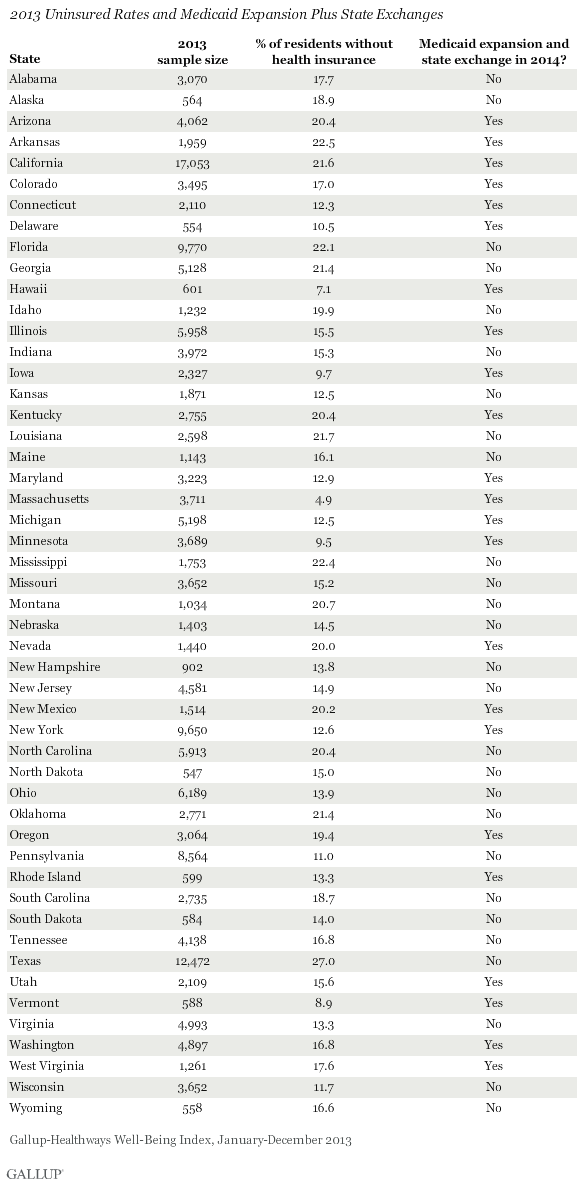WASHINGTON, D.C. -- Texas, Arkansas, Mississippi, Florida, and Louisiana are the states with the highest percentage of uninsured adult residents, but Arkansas is the only one of the five that has chosen to expand Medicaid and to set up its own state exchange in the health insurance marketplace. Of the 12 states with the highest uninsured rates, eight have thus far decided not to expand Medicaid or establish state-based exchanges.
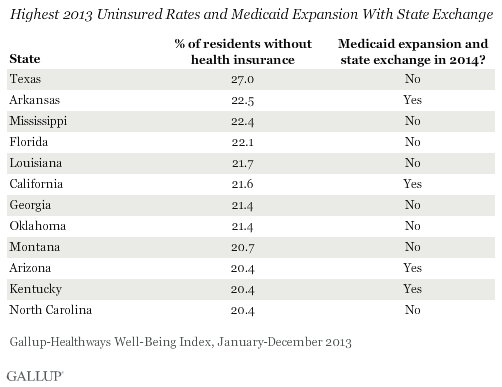
Nationally, 17.3% of U.S. adults reported being without health insurance in 2013, a percentage that has slowly increased from 14.8% in 2008. These data, collected as part of the Gallup-Healthways Well-Being Index, are based on respondents' self-reports of health insurance status based on the question, "Do you have health insurance coverage?"
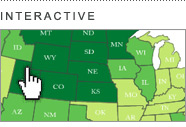 |
| Explore complete state data > |
Some states have chosen to implement state-federal "partnership" exchanges. For purposes of this analysis, these partnerships are counted along with the state exchanges. Only two states, North Dakota and New Jersey, have decided to expand Medicaid without also administering a state-based exchange, while several others continue to debate its expansion.
In contrast to the states with the highest rates of uninsured residents, the 11 states with the lowest percentage of uninsured are considerably more likely to have already approved Medicaid expansion and state exchanges. All five states with an uninsured rate below 10% -- Massachusetts, Hawaii, Vermont, Minnesota, and Iowa -- have elected to do so. Pennsylvania, Wisconsin, and Kansas are the three of the 11 that have not.
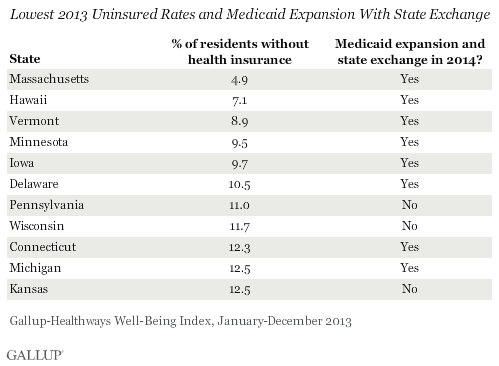
See Page 2 for a full listing of all 50 states.
Overall, 16.2% of adults report that they lack health insurance in states that have thus far chosen Medicaid expansion and state exchanges, compared with 18.7% among adults in states that are implementing one or neither.
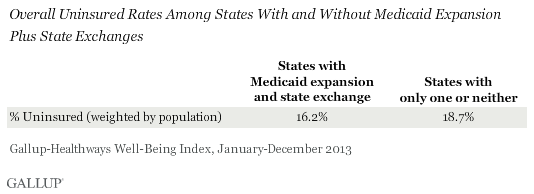
Regional Differences Continue to Shape the U.S. Insurance Situation
States with the lowest percentages of uninsured residents continue to cluster in the East and upper Midwest, while states with the highest uninsured rates are in the South and the West. For the sixth straight year, Texas has the highest rate of uninsured residents, while Massachusetts has the lowest.
Implications
As states grapple with how to implement the Affordable Care Act, a pattern has emerged that reveals that states with the highest rates of uninsured residents are among the least likely to expand Medicaid and to establish state-based exchanges. Utah's apparent recent decision to expand Medicaid means that for the first time, a majority of states (plus the District of Columbia) plan to do so. Thus far, however, most states headed by Republican governors have decided against voluntary state action, preferring to pursue other means of lowering uninsured rates among their residents.
While a majority of Americans continue to disapprove of the law, preliminary data suggest that its intended effects are beginning to occur, with a small decline in the percentage who are uninsured reported in mid-January. And, for the first time since October, when Gallup began regularly tracking uninsured Americans' plans for getting insurance, a majority of the uninsured now plan to get their insurance from exchanges.
Gallup's "State of the States" series reveals state-by-state differences on political, economic, and well-being measures Gallup tracks each day. New stories based on full-year 2013 data will be released in the coming months.
Survey Methods
Results are based on telephone interviews conducted as part of the Gallup-Healthways Well-Being Index survey Jan. 2-Dec. 29, 2013, with a random sample of 178,068 adults, aged 18 and older, living in all 50 U.S. states and the District of Columbia.
The margin of sampling error for most states is ±1 to ±2 percentage points, but is as high as ±4 points for states with smaller population sizes such as Wyoming, North Dakota, South Dakota, Delaware, and Hawaii.
Interviews are conducted with respondents on landline telephones and cellular phones, with interviews conducted in Spanish for respondents who are primarily Spanish-speaking. Each sample of national adults includes a minimum quota of 50% cellphone respondents and 50% landline respondents, with additional minimum quotas by time zone within region. Landline and cellular telephone numbers are selected using random-digit-dial methods. Landline respondents are chosen at random within each household on the basis of which member had the most recent birthday.
Samples are weighted to correct for unequal selection probability, nonresponse, and double coverage of landline and cell users in the two sampling frames. They are also weighted to match the national demographics of gender, age, race, Hispanic ethnicity, education, region, population density, and phone status (cellphone only/landline only/both, cellphone mostly, and having an unlisted landline number). Demographic weighting targets are based on the most recent Current Population Survey figures for the aged 18 and older U.S. population. Phone status targets are based on the most recent National Health Interview Survey. Population density targets are based on the most recent U.S. census. All reported margins of sampling error include the computed design effects for weighting.
In addition to sampling error, question wording and practical difficulties in conducting surveys can introduce error or bias into the findings of public opinion polls.
For more details on Gallup's polling methodology, visit www.gallup.com.
